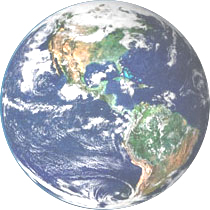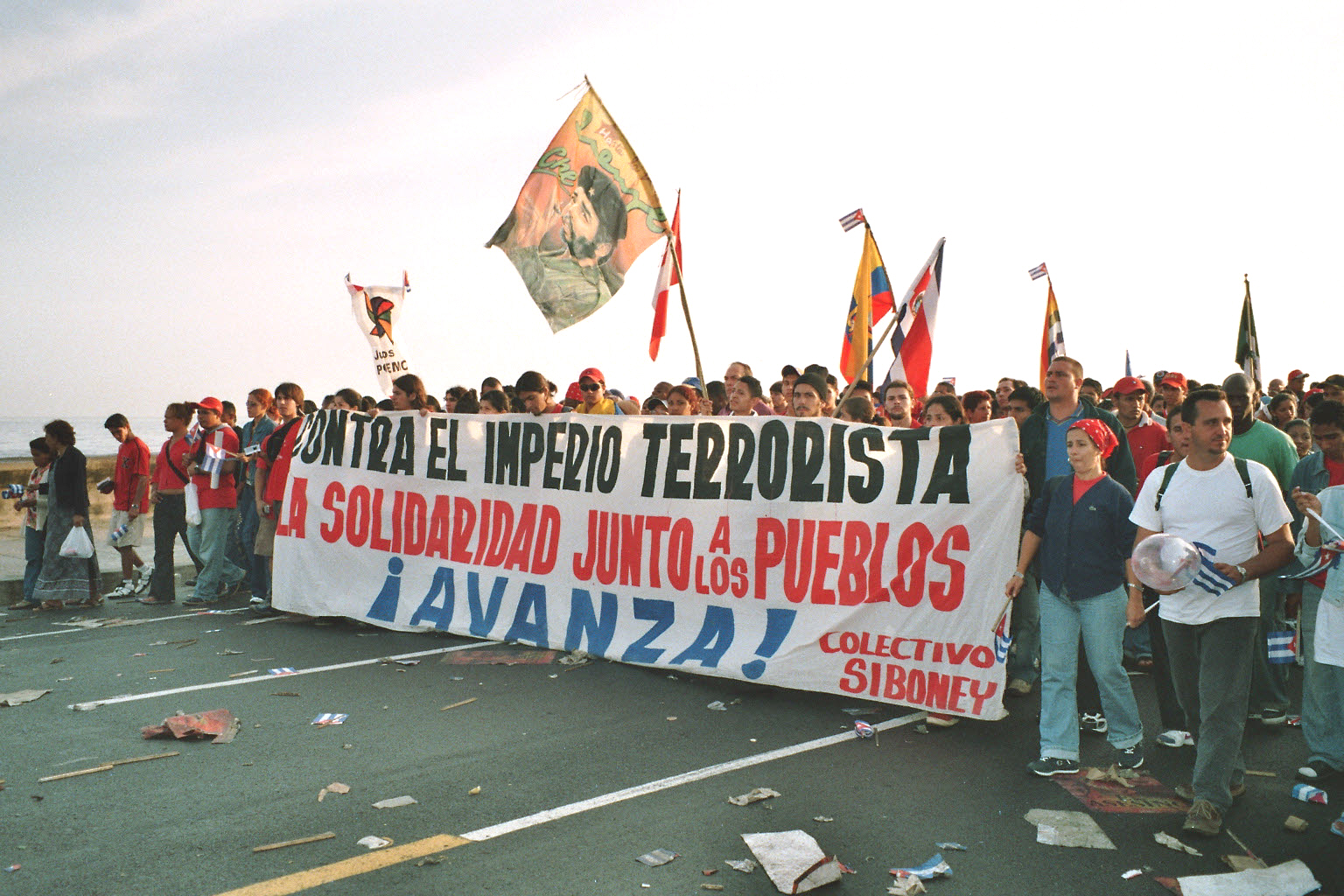THE DEBATE HEATS UP...
posted by F Espinoza | 10.05.2007 14:57 | Globalisation | Workers' Movements



THE DEBATE HEATS UP
Atilio Borón, a prestigious leftist intellectual who until recently headed the Latin American Council of Social Sciences (CLACSO), wrote an article for the 6th Hemispheric Meeting of Struggle against the FTAs and for the Integration of Peoples which just wrapped up in Havana; he was kind enough to send it to me along with a letter.
The gist of what he wrote I have summarized using exact quotes of paragraphs and phrases in his article; it reads as follows:
Pre-capitalist societies already knew about oil which surfaced in shallow deposits and they used for non-commercial purposes, such as waterproofing the wooden hulls of ships or in textile products, or for torches. Its original name was ‘petroleum’ or stone-oil.
By the end of the 19th century –after the discovery of large oilfields in Pennsylvania, United States, and the technological developments propelled by the massive use of the internal combustion engine-- oil became the energy paradigm of the 20th century.
Energy is conceived of as just merchandise. Like Marx warned us, this is not due to the perversity or callousness of some individual capitalist or another, but rather the consequence of the logic of the accumulation process, which is prone to the ceaseless “mercantilism” that touches on all components of social life, both material and symbolic. The mercantilist process did not stop with the human being, but simultaneously extended to nature. The land and its products, the rivers and the mountains, the jungles and the forests became the target of its irrepressible pillage. Foodstuffs, of course, could not escape this hellish dynamic. Capitalism turns everything that crosses its path into merchandise.
Foodstuffs are transformed into fuels to make viable the irrationality of a civilization that, to sustain the wealth and privilege of a few, is brutally assaulting the environment and the ecologic conditions which made it possible for life to appear on Earth.
Transforming food into fuels is a monstrosity.
Capitalism is preparing to perpetrate a massive euthanasia on the poor, and particularly on the poor of the South, since it is there that the greatest reserves of the earth’s biomass required to produce biofuels are found. Regardless of numerous official statements assuring that this is not a choice between food and fuel, reality shows that this, and no other, is exactly the alternative: either the land is used to produce food or to produce biofuels.
The main lessons taught us by FAO data on the subject of agricultural land and the consumption of fertilizers are the following:
• Agricultural land per capita in developed capitalism almost doubles that existing in the underdeveloped periphery: 3.26 acres per person in the North as opposed to 1.6 in the South; this is explained by the simple fact that close to 80 percent of the world population live in the underdeveloped periphery.
• Brazil has slightly more agricultural land per capita than the developed countries. It becomes clear that this nation will have to assign huge tracts of its enormous land surface to meet the demands of the new energy paradigm.
• China and India have 1.05 and 0.43 acres per person respectively.
• The small nations of the Antilles, with their traditional one-crop agriculture, that is sugarcane, demonstrate eloquently its erosive effects exemplified by the extraordinary rate of consumption of fertilizers per acre needed to support this production. If in the peripheral countries the average figure is 109 kilograms of fertilizer per hectare (as opposed to 84 in developed countries), in Barbados the figure is 187.5, in Dominica 600, en Guadeloupe 1,016, in St. Lucia 1,325 and in Martinique 1,609. The use of fertilizers is tantamount to intensive oil consumption, and so the much touted advantage of agrifuels to reduce the consumption of hydrocarbons seems more an illusion than a reality.
The total agricultural land of the European Union is barely sufficient to cover 30 percent of their current needs for fuel but not their future needs that will probably be greater. In the United States, the satisfaction of their current demand for fossil fuels would require the use of 121 percent of all their agricultural land for agrifuels.
Consequently, the supply of agrifuels will have to come from the South, from capitalism's poor and neocolonial periphery. Mathematics does not lie: neither the United States nor the European Union have available land to support an increase in food production and an expansion of the production of agrifuels at the same time.
Deforestation of the planet would increase the land surface suitable for agriculture (but only for a while). Therefore this would be only for a few decades, at the most. These lands would then suffer desertification and the situation would be worse than ever, aggravating even further the dilemma pitting the production of food against that of ethanol or biodiesel.
The struggle against hunger –and there are some 2 billion people who suffer from hunger in the world– will be seriously impaired by the expansion of land taken over by agrifuel crops. Countries where hunger is a universal scourge will bear witness to the rapid transformation of agriculture that would feed the insatiable demand for fuels needed by a civilization based on their irrational use. The only result possible is an increase in the cost of food and thus, the worsening of the social situation in the South countries.
Moreover, the world population grows 76 million people every year who will obviously demand food that will be steadily more expensive and farther out of their reach.
In The Globalist Perspective, Lester Brown predicted less than a year ago that automobiles would absorb the largest part of the increase in world grain production in 2006. Of the 20 million tons added to those existing in 2005, 14 million were used in the production of fuels, and only 6 million tons were used to satisfy the needs of the hungry. This author affirms that the world appetite for automobile fuel is insatiable. Brown concluded by saying that a scenario is being prepared where a head-on confrontation will take place between the 800 million prosperous car owners and the food consumers.
The devastating impact of increased food prices, which will inexorably happen as the land is used either for food or for fuel, was demonstrated in the work of C. Ford Runge and Benjamin Senauer, two distinguished professors from the University of Minnesota, in an article published in the English language edition of the Foreign Affairs magazine whose title says it all: “How Biofuels Could Starve the Poor”. The authors claim that in the United States the growth of the agrifuel industry has given rise to increases not only in the price of corn, oleaginous seeds and other grains, but also in the prices of apparently unrelated crops and products. The use of land to grow corn which will feed the fauces of ethanol is reducing the area for other crops. The food processors using crops such as peas and young corn have been forced to pay higher prices in order to ensure their supplies. This is a cost that will eventually be passed on to the consumer. The increase in food prices is also hitting the livestock and poultry industries. The higher costs have produced an abrupt decrease in income, especially in the poultry and pork sectors. If income continues to decrease, so will production, and the prices of chicken, turkey, pork, milk and eggs will increase. They warn that the most devastating effects of increasing food prices will be felt especially in Third World countries.
Studies made by the Belgian Office of Scientific Affairs shows that biodiesel causes more health and environmental hazards because it creates a more pulverized pollution and releases more pollutants that destroy the ozone layer.
With regards to the argument claming that the agrifuels are harmless, Victor Bronstein, a professor at the University of Buenos Aires, has demonstrated that:
•It is not true that biofuels are a renewable and constant energy source, given that the crucial factor in plant growth is not sunlight but the availability of water and suitable soil conditions. If this were not the case, we would be able to grow corn or sugarcane in the Sahara Desert. The effects of large-scale production of biofuels will be devastating.
•It is not true that they do not pollute. Even if ethanol produces less carbon emissions, the process to obtain it pollutes the surface and the water with nitrates, herbicides, pesticides and waste, and the air is polluted with aldehydes and alcohols that are carcinogens. The presumption of a "green and clean" fuel is a fallacy.
The proposal of agrifuels is unviable, and it is ethically and politically unacceptable. But it is not enough just to reject it. It is necessary to implement a new energy revolution, but one that is at the service of the people and not at the service of the monopolies and imperialism. This is, perhaps, the most important challenge of our time, concludes Atilio Borón.
As you can see, this summary took up some space. We need space and time; practically a book. It has been said that the masterpiece which made author Gabriel García Márquez famous, One Hundred Years of Solitude, required him to write fifty pages for each page that was printed. How much time would my poor pen need to refute those who for a material interest, ignorance, indifference or even for all three at the same time defend the evil idea and to spread the solid and honest arguments of those who struggle for the life of the species?
Some very important opinions and points of view were discussed at the Hemispheric Meeting in Havana. We should talk about those that brought us real-life images of cutting sugarcane by hand in a documentary film that seemed a reflection of Dante’s Inferno. A growing number of opinions are carried by the media every day and everywhere in the world, from institutions like the United Nations right up to national scientific associations. I simply perceive that the debate is heating up. The fact that the subject is being discussed is already an important step forward.
Fidel Castro Ruz
May 9, 2007
5:47 p.m.
ESTA TARDE: Mesa Redonda y Tribuna Abierta
Tratará sobre la repercusión de las nuevas reflexiones de nuestro Comandante en Jefe publicadas hoy y sobre la liberación de cargos del siniestro terrorista Luis Posada Carriles.
Correo:
 digital@jrebelde.cip.cu
digital@jrebelde.cip.cu 10 de mayo de 2007
Cubavisión, el Canal Educativo, Cubavisión Internacional, Radio Rebelde y Radio Habana Cuba transmitirán, a partir de las 6:00 p.m.(hora de CUBA), una Mesa Redonda Informativa sobre la repercusión de las nuevas reflexiones de nuestro Comandante en Jefe publicadas hoy y sobre la liberación de cargos del siniestro terrorista Luis Posada Carriles.
A las 7:00 p.m., la Mesa Redonda dará paso a la Tribuna Abierta de Protesta de la Unión Nacional de Escritores y Artistas de Cuba desde el Monte de las Banderas de la Tribuna Antiimperialista.
Sintonizar en:
 http://www.rrebelde.cu
http://www.rrebelde.cu  http://www.radioprogreso.cu
http://www.radioprogreso.cu  http://www.radiohc.cu
http://www.radiohc.cu  http://www.rhc.cu/
http://www.rhc.cu/  http://www.cubavision.cubaweb.cu
http://www.cubavision.cubaweb.cu  http://www.mesaredonda.cu
http://www.mesaredonda.cu  http://www.juventudrebelde.cu/tv/
http://www.juventudrebelde.cu/tv/  http://www.cubainformacion.tv/
http://www.cubainformacion.tv/
posted by F Espinoza